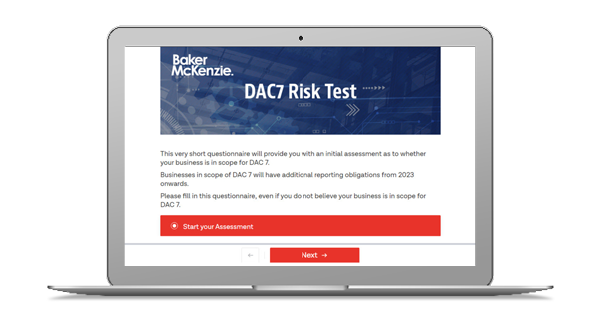Through the EU Directive on Restructuring and Insolvency of 20 June 2019 (EUR 2019/1023, “Directive”), the European Union has imposed an obligation on its member states to offer a more attractive and flexible restructuring scheme in their respective local law. The initial deadline to do so had been 17 July 2021. Only a handful of countries (most notably Germany and The Netherlands) had implemented the Directive within the initial deadline, whilst the other countries made use of the possibility to ask for a one year extension.
We are pleased to introduce you to ERIC, our digital Employment Risk Check.
With a few clicks, ERIC uses a traffic light system to tell you whether there is room for improvement in your company’s employment law compliance.
In our hybrid kick-off event of the newly founded – VUJ Expert Group on Data Protection Law on the topic “The “End” for International Data Transfers? Recent developments and practical advice” , shed light on the following topics:
• International data transfers in transition
• Google analytics and the international consequences
• Approaches and alternatives for practice
Baker McKenzie’s Sanctions Blog published the alert titled “Russia imposes a ban on foreign aircraft flights from 36 states” on 1 March 2022. Read the article via the link here. Please also visit our Sanctions Blog for the most recent updates.
Just and sustainable economy: Commission lays down rules for companies to respect human rights and environment in global value chains
On 23 February 2022 the European Commission has adopted a proposal for a Directive on corporate sustainability due diligence. The proposal aims to foster sustainable and responsible corporate behaviour throughout global value chains. They will be required to identify and, where necessary, prevent, end or mitigate adverse impacts of their activities on human rights, such as child labour and exploitation of workers, and on the environment, for example pollution and biodiversity loss.
At the request of the Single Resolution Board (SRB) SBERBANK Europe AG, domiciled in Vienna, was placed under a moratorium by the Austrian Regulator, FMA, on 27 February 2022. Despite measures SBERBANK took to stem the outflow of funds the SRB decision finds it is likely to be unable to meet its payment obligations at maturity. SRB also held that current and future sanctions – US sanctions limiting access to USD supply by correspondent banks only take effect on 26 March 2022 – make it unlikely that SBERBANK’s liquidity situation will quickly recover. The FMA implemented the SRB’s decision of 27 February 2022 (SRB EES-2022-16), as per the provisions of the Austrian Act on Restructuring and Liquidation of banks (BaSAG) and Art 29 SRM Regulation.
In March 2021, the EU approved new reporting rules in a directive known as DAC7. The directive will require the operators of online platforms for the sale of goods and certain services, to collect, verify and share data on their sellers and their transactions concluded on the online platform. EU member states have until 31 December 2022 to implement DAC7 into national law. Certain platform operators will become a reporting platform and will need to start collecting and verifying data points in compliance with the DAC7 reporting requirements. The collected data points must be reported to the tax authorities of the relevant EU member state annually.
This virtual session will give you a comprehensive overview on the topic of “flexibility of working place and working time” as well as “protection of health and data”. Please note that this event will be in held in German only.
Against the background of the EU Posting Workers Directive and the ECJ case law, the Wage and Social Dumping Prevention Act (“Lohn- und Sozialdumping-Bekämpfungsgesetz”, “LSD-BG”) has been amended effective as of 1 September 2021. In summary, the scope of the Wage and Social Dumping Prevention Act was limited and the provisions regarding administrative penalties were mitigated. However, provisions for long-term postings are now stricter.
The world of work after COVID-19 is not the same as before. The pandemic has triggered a change in employment law and created new challenges.



